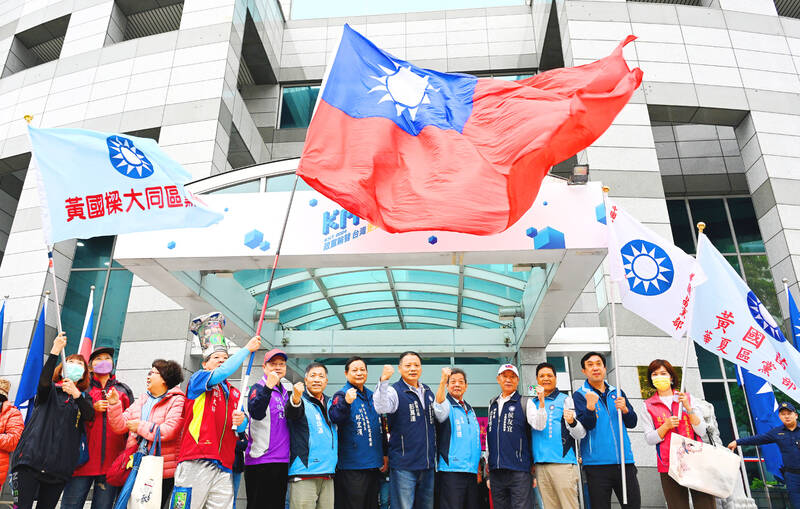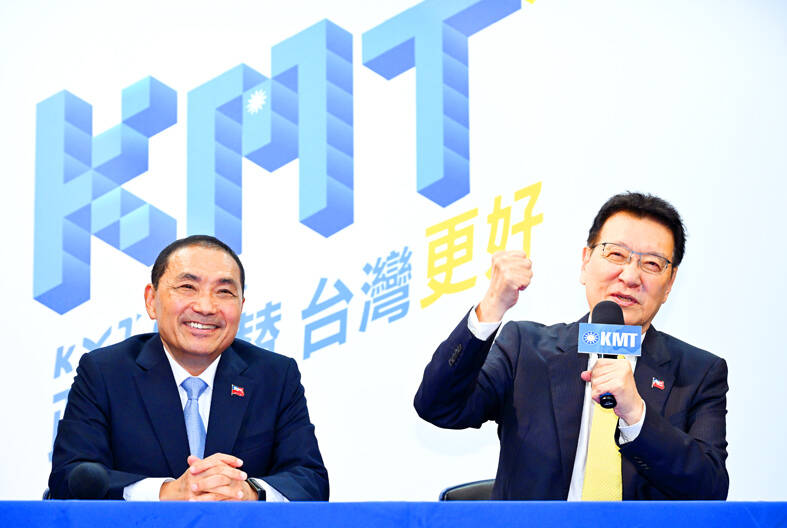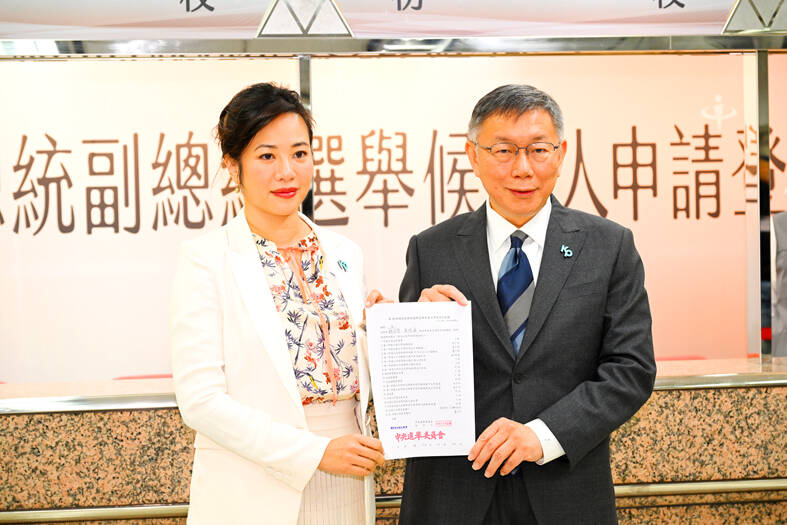The Chinese Nationalist Party (KMT) and Taiwan People’s Party (TPP) registered their own candidates yesterday after a breakdown in coalition talks, while independent candidate Terry Gou (郭台銘) dropped out, setting up a three-way race for the presidential election in January.
TPP Chairman Ko Wen-je (柯文哲) was the first to officially register his candidacy with the Central Election Commission in Taipei yesterday, shortly after naming TPP Legislator Cynthia Wu (吳欣盈) as his running mate.
Wu, the daughter of former Shin Kong Financial Holding Co (新光金控) chairman Eugene Wu (吳東進), is a TPP legislator-at-large who was appointed in November last year and had served previously as vice president of Shin Kong Life Insurance Co (新光人壽).

Photo: Liao Chen-huei, Taipei Times
About an hour after Ko, New Taipei City Mayor Hou You-yi (侯友宜), the KMT candidate, registered at the commission after naming Broadcasting Corp of China (中廣) chairman Jaw Shaw-kong (趙少康) as the party’s vice presidential pick.
Jaw, 73, had parted ways with the KMT in 1993 to form the New Party, in what was a split from the KMT by members of a faction known as the New KMT Alliance.
However, Jaw’s KMT membership was restored in February 2021, as he was seen by some influential members as a prime candidate for the party’s chairmanship and next year’s presidential ticket.

Photo: Liao Chen-huei, Taipei Times
The registrations officially ended the KMT’s bid over the past months to team up with the TPP on a joint opposition ticket in an effort to defeat the Democratic Progressive Party (DPP).
Gou, founder of Hon Hai Precision Industry Co (鴻海精密), known internationally as Foxconn, announced his withdrawal from the election hours before the registration deadline in a brief statement.
Gou did not provide a specific reason, saying that such a decision was “for the future of the Republic of China.”

Photo: Tien Yu-hua, Taipei Times
With the registration deadline past, the election on Jan. 13 is to be a three-way race between the candidates of the KMT and the TPP, and the DPP candidates Vice President William Lai (賴清德) and former representative to the US Hsiao Bi-khim (蕭美琴).
At a news conference yesterday, Hou lauded Jaw as “the most formidable, capable and combat-ready candidate.”
Hou also said that up until the last minute, Jaw had been hoping that the KMT would reach an agreement with Ko on a joint ticket.
Hou said that he had personally called Ko to make a final pitch for a KMT-TPP alliance, but “the call was not answered.”
KMT Chairman Eric Chu (朱立倫) said that although it was humiliating, he and Hou had tried to push for a joint ticket with the TPP.
Chu called for solidarity within the KMT, and urged the members to work toward the common goal of getting Hou elected.
Separately, Ko yesterday said that as the “leader of Taiwan’s opposition parties,” he felt duty bound to enter the election against a ruling party that is “increasingly out of touch with the people and progressive values.”
Taiwan has been plagued by stagnant wages, high housing prices and high rent, with healthcare and labor insurance systems under financial strain, Ko said.
Shortages of labor, land, talent, electricity and water have caused many to become disillusioned and stop pursuing their dreams, he said.
Maintaining the “status quo” in the Strait and pursuing peace is the “common denominator” shared by Taiwan, China and the US, Ko said.
Regarding his running mate, Ko said that Wu had graduated from prestigious colleges in the US and the UK, and had served as the executive director at the Shin Kong Life Foundation.
Wu’s nomination was decided by the TPP’s election committee in a vote, Ko said.

The US government has signed defense cooperation agreements with Japan and the Philippines to boost the deterrence capabilities of countries in the first island chain, a report by the National Security Bureau (NSB) showed. The main countries on the first island chain include the two nations and Taiwan. The bureau is to present the report at a meeting of the legislature’s Foreign Affairs and National Defense Committee tomorrow. The US military has deployed Typhon missile systems to Japan’s Yamaguchi Prefecture and Zambales province in the Philippines during their joint military exercises. It has also installed NMESIS anti-ship systems in Japan’s Okinawa

TRAGEDY STRIKES TAIPEI: The suspect died after falling off a building after he threw smoke grenades into Taipei Main Station and went on a killing spree in Zhongshan A 27-year-old suspect allegedly threw smoke grenades in Taipei Main Station and then proceeded to Zhongshan MRT Station in a random killing spree that resulted in the death of the suspect and two other civilians, and seven injured, including one in critical condition, as of press time last night. The suspect, identified as a man surnamed Chang Wen (張文), allegedly began the attack at Taipei Main Station, the Taipei Fire Department said, adding that it received a report at 5:24pm that smoke grenades had been thrown in the station. One man in his 50s was rushed to hospital after a cardiac arrest

PUBLIC SAFETY: The premier said that security would be tightened in transport hubs, while President Lai commended the public for their bravery The government is to deploy more police, including rapid response units, in crowded public areas to ensure a swift response to any threats, President William Lai (賴清德) said yesterday after a knife attack killed three people and injured 11 in Taipei the previous day. Lai made the remarks following a briefing by the National Police Agency on the progress of the investigation, saying that the attack underscored the importance of cooperation in public security between the central and local governments. The attack unfolded in the early evening on Friday around Taipei Main Station’s M7 exit and later near the Taipei MRT’s Zhongshan

ON ALERT: Taiwan’s partners would issue warnings if China attempted to use Interpol to target Taiwanese, and the global body has mechanisms to prevent it, an official said China has stationed two to four people specializing in Taiwan affairs at its embassies in several democratic countries to monitor and harass Taiwanese, actions that the host nations would not tolerate, National Security Bureau (NSB) Director-General Tsai Ming-yen (蔡明彥) said yesterday. Tsai made the comments at a meeting of the legislature’s Foreign Affairs and National Defense Committee, which asked him and Minister of National Defense Wellington Koo (顧立雄) to report on potential conflicts in the Taiwan Strait and military preparedness. Democratic Progressive Party (DPP) Legislator Michelle Lin (林楚茵) expressed concern that Beijing has posted personnel from China’s Taiwan Affairs Office to its